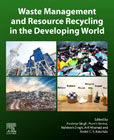
Waste Management and Resource Recycling in the Developing World
Singh, Pardeep
Verma, Pramit
Singh, Rishikesh
Ahamad, Arif
Batalhao, Andre
Waste Management and Resource Recycling in the Developing World provides a unique perspective on the state of waste management and resource recycling in the developing world, offering practical solutions based on innovative tools and technologies as well as examples and case studies from developed regions. There is high potential for waste management to produce energy and value-added products, and sustainable waste management based on a circular economy not only improves sanitation, it also provides economic and environmental benefits. In addition to waste minimization, waste-to-economy and waste-to-energy have become integral parts of waste management practices. A proper waste management strategy not only leads to reduction in environmental pollution but also moves toward generating sufficient energy for improving environmental sustainability in the coming decades. Waste Management and Resource Recycling in the Developing World is organized by waste type, including electronic, industrial, and biomedical/hazardous, and each section covers advanced techniques in waste management, such as remote sensing and GIS, as well as socioeconomic factors, transnational transport, and policy implications. Waste managers, environmental scientists, sustainability practitioners, and engineers will find this a valuable resource for addressing the challenges of waste management in the developing world. Presents case studies in every section to illustrate practical applications across the globe Includes lessons learned from developed regions to apply to developing regions Organized by type of waste with consistent coverage in each section to promote ease of navigation INDICE: Section 1 Generation of Waste Problem to Possible Solution in Developing and Under Developing Nations 1. Waste generation in developing countries: MSW, agricultural and industrial 2. Trade-offs between population growth and waste management practices (recycle, reuse, reduce, landfills, incineration, etc.), Global South perspective Section 2 Waste Management Status in Developing Nations: Need to Learn Lesson from Developed Nations 3. Waste management lessons from developed countries 4. Transnational transport of waste and its implications on the human well-being and climate change. (e-waste, etc) Section 3 Waste to Energy MSW and Agriculture Residue 5. Waste characterization: MSW and agricultural waste conversion to energy 6. Application of waste-to-energy technologies: Case study from developing and developing country Section 4 Waste to Economy (Concept and Application) 7. Waste to economy: concepts, circular economy and benefits 8. Application of waste-to-economy practices: implications for environmental and human health Section 5 Solution and Advance Management Techniques for Waste Management 9. Advancements in waste management technologies 10. Application of remote sensing and GIS in waste management: Waste disposal and monitoring Section 6 Waste Management in Respect to Sustainability of Resources in The Era of Global Population Concern and Climate Change 11. Regional carrying capacity for waste management - Shifting focus from waste generation to sustainable consumption (waste minimization)? 12. Conversion of waste materials into different byproducts of economic value 13. Zero waste: A holistic view of the sustainable management of resources 14. Human psychology and public awareness to deal with the problem of solid waste
- ISBN: 978-0-323-90463-6
- Editorial: Elsevier
- Encuadernacion: Rústica
- Páginas: 500
- Fecha Publicación: 01/08/2022
- Nº Volúmenes: 1
- Idioma: Inglés
